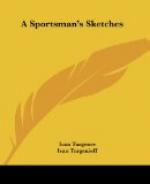|
This section contains 7,101 words (approx. 24 pages at 300 words per page) |

|
SOURCE: Masing-Delic, Irene. “Philosophy, Myth, and Art in Turgenev's Notes of a Hunter.” Russian Review 50, no. 4 (October 1991): 437-50.
In the following essay, Masing-Delic discusses Turgenev as both a Slavophile and an admirer of Western culture in light of the sketches in A Sportsman's Sketches or Notes of a Hunter.
In “Hamlet from Shchigry District,” one of the sketches in Ivan Turgenev's Notes of a Hunter [A Sportsman's Sketches] (1852), the narrator's unknown interlocutor refuses to give his name, merely calling himself a provincial Hamlet. The reason is that he bitterly resents what he calls his lack of originality. He keenly feels the irony of being deemed original by his naive rural neighbors whereas he himself is convinced that he lacks uniqueness. Representing an as yet novel type in the Russian provinces, he was nevertheless “born a copy of someone else”1 and spent his life imitating various models, mainly culled...
|
This section contains 7,101 words (approx. 24 pages at 300 words per page) |

|


